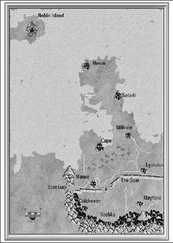The echoing chorus would come:
"She's not to blame. After all, she comes from a broken home."
"Her determination to have the baby is a sign of her strong character."
"Throw her out? Then what about Reuven?"
"We mustn't react emotionally. It needs thought."
The direction of the public mind in our kibbutz is an extremely subtle process. You cannot stand up and preach to a community of mature, sophisticated men and women. You have to talk to individuals. You have to choose wisely whom to talk to. This delicate task modest Herbert Segal took upon himself. His first move was to call a meeting of Noga's classmates; he brought them to an understanding of the situation without exercising his authority. Oren Giva did not stand in his way. Next, Herbert turned to Gai Harish and sealed a secret compact with him. Then he discreetly stimulated the maternal feelings of the older women. Not with high-flown phrases. He played on their sympathy with hints and asides. He quenched their blazing moral fury: nothing was easier than to expel someone from their midst to keep the camp pure and free from taint. But what would happen afterward? Would we be able, as a community, to look ourselves in the eye? Easy solutions were a sign of weakness. Were we to counter the weakness of a poor, confused girl with our own collective weakness? No, we mustn't be governed by weakness. Otherwise, we would lose our moral justification and our right to judge the girl. She was a victim, and so was her father, and we must not forget it for a moment, because we were responsible for the happiness of each individual among us, and because Reuven was one of us, and his daughter was one of us, too. We must not treat her as a dangerous example or a corrupting influence. Such notions were alien to our spirit. She was neither an example nor an influence; she was a sixteen-year-old girl. We must not react like ignorant, prejudiced peasants. Could you imagine this girl thrown out on the street?
A flood of compassion broke over our kibbutz toward the end of the summer. The women competed in good works and acts of kindness toward the straying lamb. She was surrounded by sympathy and warmth. Sincere invitations to come round and talk. You're so lonely. Why don't you come and have tea with us, come and have a rest, take a shower, look at pictures, pour out your troubles? The women in the sewing room acted beyond the call of duty. After complicated calculations they managed to ascertain Noga's current measurements without an embarrassing fitting. They made her a set of maternity clothes, and Einav Geva smuggled them into her room.
Esther Klieger presented Noga with a brightly wrapped book, saying:
"For you. Read it. No need to give it back. Keep it. Only make sure my Dafna doesn't get hold of it."
"But… why? What is it?"
"Look and see. Very useful book. Do you feel all right, my dear? Yes? You can always turn to me. Even in the middle of the night. Don't be too shy. You're like my own Dafna to me. Grisha feels the same way as I do. For us you're Dafna's sister. Yes. Take good care of yourself, my dear. And don't forget to come."
Noga unwrapped the book. A guide for the expectant mother. Blushing slightly, Noga thanked Esther Klieger. Esther was delighted.
Within the next few days the following books were collected and handed over to her: Childbirth Without Tears, Introduction to Sex, Bringing Up Your Child, and also two identical copies — one from Hasia Ramigolski and the other from Gerda Zohar — of The Happy Mother.
Even in the dining hall, Noga was treated to dainty tidbits — chicken liver, dairy produce, raw carrot, malt beer, and sweets normally reserved for babies and small children.
Stubborn soul. How she must have suffered in her short life, that she rejects the generous kindness of the women and prefers the solitary company of a rather shady tourist who is visiting the kibbutz. Furthermore, she spends an undesirable amount of time sleeping.
Fruma Rominov approached the health committee with the suggestion that Noga Harish should be sent to a private nursing home in Haifa for the next few months. In the first place, psychologically she needed a change of atmosphere. Second, physically the girl was underweight. Her hips were too narrow. She needed to put on weight before the birth, which might be a difficult one. Third, which ought to be first, really, she ought to be removed from a certain harmful influence. Fruma's suggestion was not adopted. The committee accepted the arguments of Gerda Zohar, its secretary: the girl should stay here, since she needed constant care — not medical care but social care.
Every Thursday the women go to the laundry and hang out the washing that is not done by machine. Once, Fruma Rominov arrived early and hung out Noga's washing. Fruma, we must bear in mind, had not been well lately. She had been complaining of dizzy spells and constant lassitude. Although the doctor had discovered no physical cause, Fruma had stopped working. She had never done such a thing before. For three weeks she had not left her room. Even her meals had been brought to her on a tray by a member of the health committee. Fruma declared that the doctor had sided with those who wanted to see her dead. It wasn't his fault. He must have been put up to it. She relied on her intuition, which had never let her down. She had sunk all her life into this place. She had sacrificed her husband. She had sacrificed her son. She would sacrifice herself. That, after all, was the easiest sacrifice of all. If only one of the officials of the kibbutz could at least take the trouble to get Rami recalled on leave, so that he could be with his mother in her last days. But no. Who would do that for her? The Pogolskis or the Ramidolskis? Huh. Fruma announced to all and sundry that her end was near. She had even dreamed of her death twice recently. The dream could not be ignored. The proof was that poor Alter, too, had dreamed of his own funeral four days before they had sent him into the banana plantation and killed him. But I won't say anything. I haven't said anything all my life. I won't say anything now in my last days. Another month or two. After my funeral, all your Golskis and Dolskis will be able to do everything they're capable of, because there won't be anyone left in this kibbutz to make them feel ashamed. Noga? Noga doesn't prove a thing. I understand her. I understand her better than anyone. If you haven't suffered yourself, you can't understand others who suffer. You might think that what has happened to her is a punishment for what she did; if my Rami weren't such a sensitive boy he could tell some terrible stories about her. But I'm not crowing. I can sense when people are really suffering. There's a saying: Don't laugh at your enemy's downfall. And, by the way, I don't like to boast, but I might add that I've also done my bit for her. And long before everybody started chasing after her with love and kisses, because the fashion changed. No, it was weeks ago, when she was treated like a mangy bitch. Neglected. Despised. Abandoned. Fruma was the one who went up to her and said "My house is open to you." I wouldn't tell anybody else this. Except for you, Herbert, because you… It doesn't matter. You'll be the one to deliver the funeral address for Fruma Rominov. I don't want any Dolski-Golskis. I want you. You can start getting your speech ready. I won't keep you waiting.
One Saturday night Reuven Harish went for his usual walk. His steps led him along the path that ran behind the cow shed and down to the fish ponds. He stopped by the water pump. He breathed deeply. He saw birds. He heard the wind. He recalled a long journey in Ezra Berger's truck. Iron rods. He saw some small stones in the dust. He stooped and picked some up. Aimed at a rusty cart shaft. Missed. Breathed deeply again. Suddenly he decided to go and see his daughter. He hadn't set eyes on her for seven weeks. Go to her room. Noga-Maris.
Читать дальше












